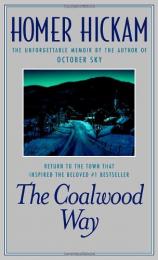Reading Group Guide
Discussion Questions
The Coalwood Way

1. As you read this memoir, did you begin to feel as if you knew the people involved? Did you like them? Do you think you'd have been happy to live in Coalwood in the late 1950's? If you had, what position in it would you have wanted? Coal miner? Foreman? Teacher? Housewife? Preacher? Doctor? Rocket Boy or Girl? Football Star? An outsider like Dreama?
Commentary: Coalwood had a distinct role for each person who lived there. In order to live in the town, it was required that the head of the household work for the mine in some capacity. The exceptions to this were the teachers at the Coalwood School. Even the preachers were company men!
2. Was this memoir similar in its construction with others that you have read? What do you think of the memoir genre? Do you think it might be hard to write a memoir that is interesting to readers?
Commentary: A memoir is, as its title implies, a memory of long-ago events. In his note in The Coalwood Way, Homer wrote: "Memoirs are tough things to write. How can you remember what somebody said or did forty years ago? I don_t have an answer. All I know is I do. I_ve changed a few names and disguised some other folks to protect them but, otherwise, this is pretty much the way it happened, I swan." We suggest a discussion of the current popularity of reading memoirs. Also see www.homerhickam.com and go to "The Rocket Boys" and "Coalwood" buttons for photos and biographies of the real people in the book.
3. How would you describe this book? Would you call it a man's book or a woman's book? Is it just a story of a boy with a dream or the story of a small mining town? Or is it something grander and deeper?
Commentary: Homer has always said he used the rockets as a metaphor to tell the true story of life in the coalfields of West Virginia but he also had something else in mind, a weaving of many allegorical themes that begin loosely connected but are gradually wound tighter and tighter until they become as one. Can you spot those themes? Homer gets lots of glowing fan mail from "reluctant readers" who had the book recommended to them, but thought they wouldn_t be interested, then they stayed up all night reading it.
4. 4. How would you describe Sonny's parents? Do you think Homer (Senior) and Elsie love each other? How do they display their love? Why to they fight?
Commentary: Homer (Junior) believes that the core to all his Coalwood memoirs is the conflict between his parents.
5. Contrast the hopes and dreams and attitudes of Dreama and Ginger? How are they similar? How are they different?
Commentary: Dreama was an outsider who saw Coalwood as a refuge from the tough little mining town of Gary. Ginger grew up in Coalwood and saw it as just the place where she lived. Her parents were also in the upper strata of social life in Coalwood. Ginger's aspirations took her far past the little town while Dreama's were centered on it.
6. Why did Elsie think the Christmas Pageant was so important to her and to Coalwood? Why did she initially give up on it and decide to go to Myrtle Beach? Why did she change her mind? Why did Sonny not want to help her on the Pageant? Why did he change his mind?
Commentary: The annual social events in an industrial town such as Coalwood came to have great meaning to the people who lived there. During the late 1950's, the mining company in Coalwood was gradually evolving from benevolent dictator to mere employer. This is illustrated by its selling of the houses and stopping its support of events such as the Christmas Pageant. Coalwood's people were changing their attitudes as well. They were starting to see an end to their relationship with the company and becoming more independent.
7. Is this a universal story? Could it be set in other times or is it specific to Coalwood and West Virginia in the late 50's?
Commentary: Homer never knows who's going to show up in his autograph lines to tell him how much they enjoyed this book. They vary from astronauts to coal miners to just about everybody, young and old.
8. This story is also about the rewards and costs of nonconformity. Who conforms, who doesnÕt and what is the consequence of their actions? Is that a problem today and can this story help those who tend to go against the expected norms? How was Quentin a nonconformist? How was Dreama different? Why did Elsie love Quentin so much but seemed to reject Dreama? Would you consider Ginger a non-conformist?
Commentary: Elsie still loves Quentin. Whenever they're together, Homer (junior) is relegated to the sidelines while they talk. It is an interesting chemistry between the two. It might be because Elsie sees Quentin as someone very much like herself - extremely talented but born to circumstances that never allowed her to fully reach her potential.
9. When you began to read about it, why did you think Sonny felt strangely sad? Did the real reason for it surprise you? Do you think allowing Quentin to psychoanalyze Sonny would have been a good idea? Why do you think Sonny didn't think so. Do you think Sonny would be diagnosed as clinically depressed these days?
Commentary: Homer wanted to write about those feelings because he's aware so many teen-agers and adults are fighting forms of depression today.
10. Why do you think Dreama stayed with Cuke? Was Cuke all bad? Why did Coalwood accept Cuke but not Dreama? Why did Dreama want to be a Coalwood girl? Did her encounter with "Santa Claus" Clowers change your opinion of her? Why did Roy Lee seem to have such a problem about Dreama? Did Dreama have a destiny that she couldn't escape?
Commentary: This is one of those underlying themes to the book, that destiny is one of life's grandest mysteries.
11. Why do you think Sonny wrote the Pageant script the way he did? Why did he choose the three "Kings" of Coalwood to be who they were? Do you think it was wrong for Coalwood to pretend it was where the Christ-child was born?
Commentary: The pageant was where Homer was headed during the entire book. There, he was able to wrap all his themes into one moment.
12. Do you think Ginger and Sonny were really a "cute couple?" Do you think they should have worked harder to be together?
Commentary: Naturally, as Homer's wife, I'm glad he didn't!
This commentary and discussion questions were written by Linda Terry Hickam, assistant (and wife!) to Homer Hickam. Visit www.homerhickam.com for more information on all of Homer's books, the film "October Sky," the real Rocket Boys, teacher information and lesson plans, photographs, and much more.
The Coalwood Way
- Publication Date: September 4, 2001
- Mass Market Paperback: 400 pages
- Publisher: Island Books
- ISBN-10: 0440237165
- ISBN-13: 9780440237167








